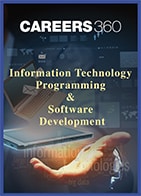Highlights
Downloads
88Language
EnglishOverview
If you need to know about the certification course in Information Technology Programming and Software Development, this e-book is for you. Download the ebook and get all related details.
Student Reviews
You may also like
Uncover relevant exams
Others:10 April,2025 - 10 April,2026
Application Date:30 September,2025 - 15 March,2026
Application Date:25 October,2025 - 30 April,2026
Application Date:15 November,2025 - 31 January,2026
Application Date:15 December,2025 - 16 March,2026
Handpicked articles curated just for you
Aug 18, 2025
Explore Personalized News Updates
QnA related to Information Technology
Ask your question related to Information Technology
Explore Personalized News Updates
